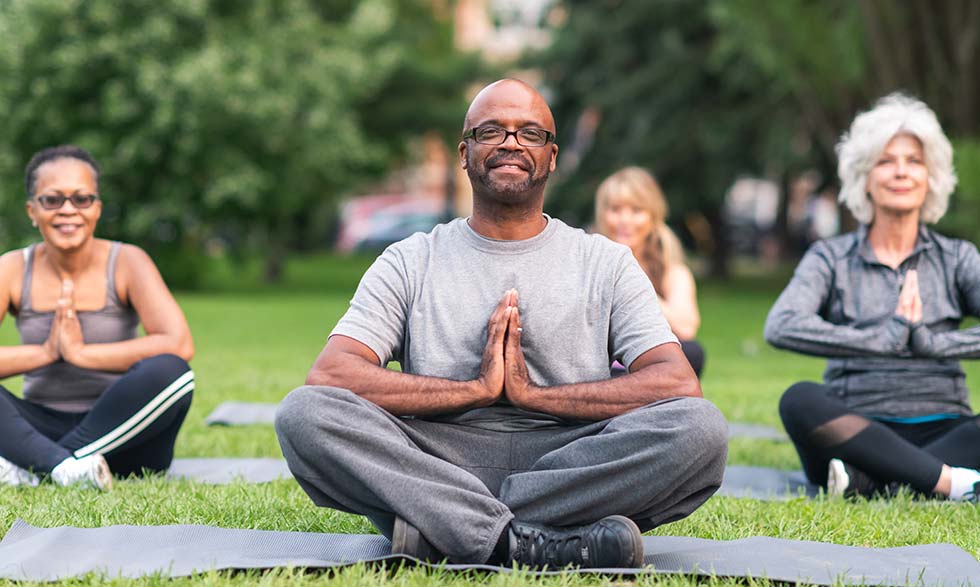Healthy aging is a continuous process of optimizing opportunities to maintain and improve physical and mental health, independence, and quality of life throughout the course of life. Promoting health and preventing disease across the lifespan is the key to staying healthy as we age.
One common myth about healthy aging is that getting older always leads to a sharp decline in physical and mental capabilities and function. Certain changes and challenges do come with aging but, it doesn’t mean that you automatically become frail, forgetful, or unable to enjoy a high quality of life. The following are some important points to consider.
Jump to A Section

Physical Fitness
It is possible for older adults to continue to lead active lives and maintain their physical fitness. Focusing time on regular exercise, including strength training and cardiovascular activities is very important. Exercise can help maintain muscle mass, bone density, and reduce the risk for falls.
Whether you love it or hate it, physical activity is a cornerstone of healthy aging. Scientific evidence suggests that people who exercise regularly not only live longer, but also may live better.
Try being physically active in short spurts throughout the day or setting aside specific times each week to exercise. Many activities, such as brisk walking or yoga, are free or low-cost and do not require special equipment. As you become more active, you will start feeling energized and refreshed after exercising instead of exhausted.
Mental Acuity
Staying mentally active through activities like puzzles, reading, and social interactions can help preserve cognitive function.
Older adults who spend at least an hour reading or engaged in other hobbies had a decreased risk of dementia compared to those who spent less than 30 minutes a day on hobbies.
Studies on music, theater, dance, creative writing, and other participatory arts show promise for improving older adults’ quality of life and well-being, from better cognitive function, memory, and self-esteem to reduced stress and increased social interaction.
Look for opportunities to participate in activities. Get out and about by going to a sporting event, trying a new restaurant, or visiting a museum.
Healthy Lifestyle

Lifestyle choices play a significant role in healthy aging. A balanced diet, limited alcohol consumption, staying socially engaged, and not smoking can have a substantial impact on overall health.
Making smart food choices can help protect you from certain health problems as you age and may even help improve brain function. As with exercise, eating well is not just about your weight.
There is research that shows the Mediterranean-style eating pattern, which includes fresh produce, whole grains, and healthy fats, but less dairy and more fish may have a positive impact on health.
Even if you haven’t thought much about healthy eating until recently, changing your diet now can still improve your well-being as an older adult. If you are concerned about what you eat, talk with your doctor about ways you can make better food choices.
Preventive Healthcare
Regular check-ups, screenings, and preventive healthcare can help catch and address potential health issues early.
In recent years, scientists have developed and improved upon laboratory, imaging, and similar biological tests that help uncover and monitor signs of age-related disease. Tests that detect these changes can help medical professionals diagnose and treat disease early, improving health outcomes.
Visit the doctor at least yearly and possibly more depending on your health. You cannot reap the benefits of medical advancements without regular trips to the doctor for physical exams and other tests.
Adaption
Developing coping mechanisms and strategies to adapt to physical and cognitive changes is also important.
Healthy living is healthy aging. Developing and maintaining healthy aging practices throughout the lifespan contributes to greater resilience and opportunities to thrive as we age – from infancy through older adulthood.
Contact an Experienced Physical Therapist Near You

Seeing a physical therapist near you can be part of your preventive healthcare team. Physical Therapists are experts at exercise prescription, can teach fall prevention, educate on how to adapt to physical changes for all sorts of conditions and help keep you living the life you love.

